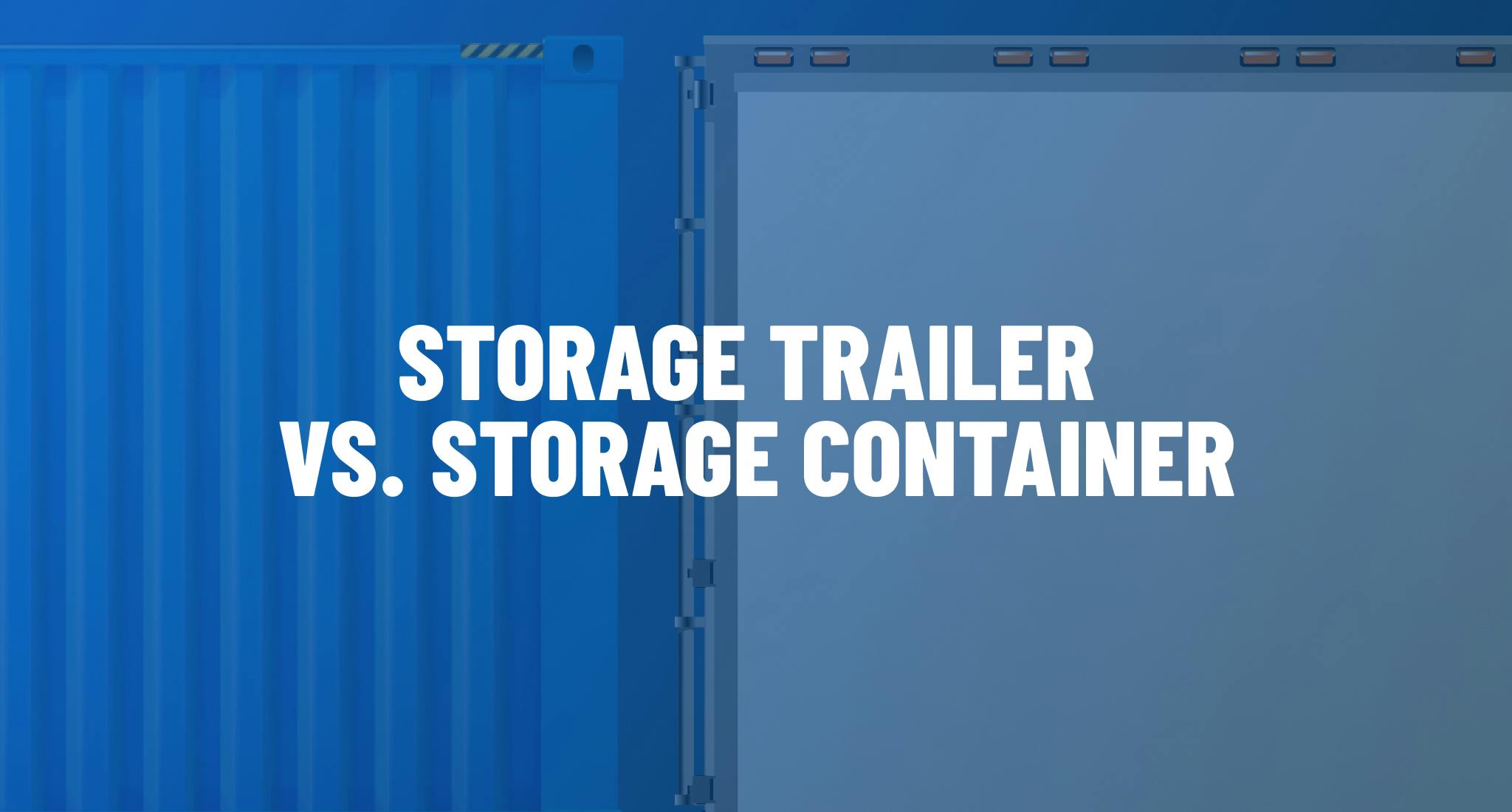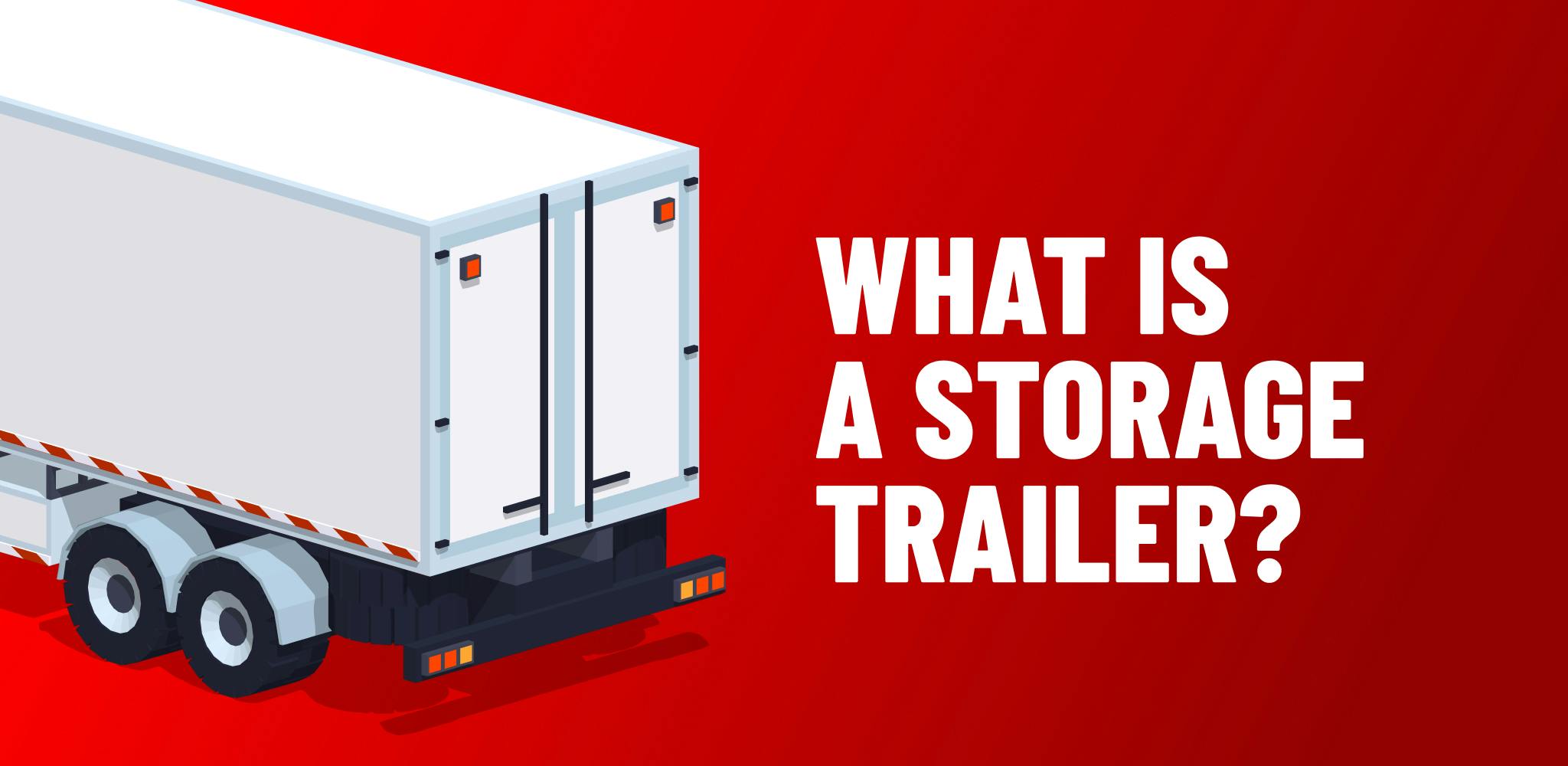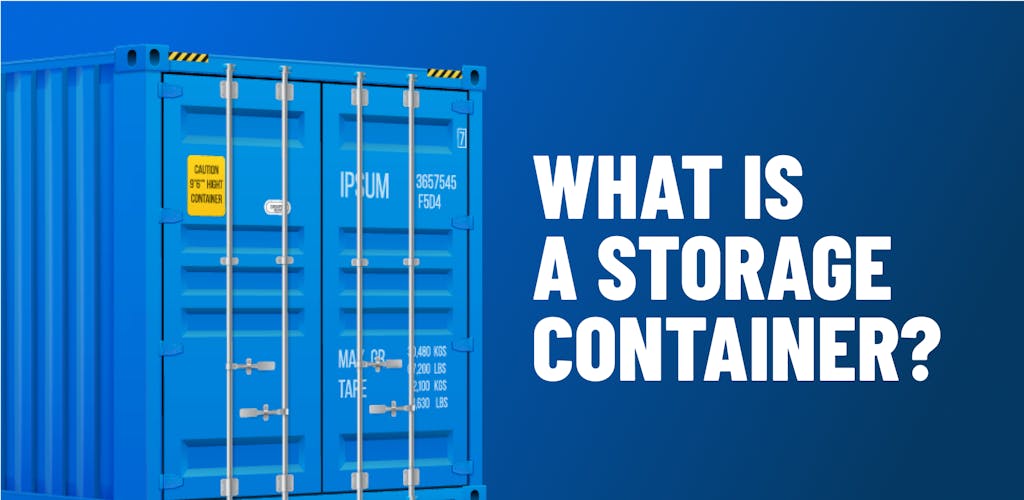Storage Trailer vs. Storage Container: What’s the Difference
January 17th, 2024

Storage trailers and storage containers both offer space for storing goods, but they have different features and uses. A storage trailer is a wheeled vehicle, usually attached to a truck for transport. It’s great for moving items from one place to another. Storage trailers are often used by businesses that need to transport large amounts of goods regularly.
Similar to trailers, a storage container trailers is a large, sturdy box without wheels. It’s designed for transport atop a flatbed trailer or can stay in one for use as a portable room or long-term storage. This article will examine both storage types and help you determine which is best for your shipping needs.
What is a Storage Trailer

A storage trailer is a large unit designed for storing goods. These trailers are versatile and commonly used in the logistics and transportation industries.
Storage trailers come in various sizes and configurations, catering to different storage needs. They offer the convenience of being able to store goods directly to where they are needed, whether it’s a retail location, a distribution center, etc.. Storage trailers are a valuable asset for companies that require a dynamic and efficient way to manage their inventory and supply chain operations.
Uses of a Storage Trailer
Storage trailers are incredibly versatile, serving multiple purposes across various industries. They are often used for temporary storage at construction sites, holding tools, materials, and equipment. Retail businesses also use them during peak seasons to manage excess inventory.
In the logistics sector, storage trailers are essential for transporting goods over long distances. They provide a secure and weather-resistant environment, making them suitable for storing sensitive items.
What is a Storage Container

A storage container, also referred to as a shipping container or cargo container, is a large, sturdy metal box designed for transporting and storing goods. Storage containers are made from high-strength steel, making them durable and weather-resistant. They come in standard sizes, typically 20 feet or 40 feet in length, which makes them ideal for shipping by sea, rail, or truck.
Storage containers are known for their robustness and ability to protect contents from the elements, theft, and damage. You’ll find thousands of storage container trailers at ports, distribution centers, and commercial hubs. These integral cogs of the logistics industry facilitate the safe and efficient transport of a wide range of goods across long distances.
Uses of a Storage Container
Storage containers also fulfill a multitude of use cases beyond shipping and logistics. They are popular in the construction industry for storing equipment and materials on-site. Due to their durability and security, they can also serve as temporary offices, workshops, or even as building blocks in modular construction.
In recent years, shipping container use has expanded into the realm of creative architecture, with containers being repurposed into homes, cafes, and art studios. Sturdy and reliable, storage containers have become a valuable asset across many sectors, from logistics and construction to art and architecture.
Key Differences Between Storage Trailers and Storage Containers
Though there are many similarities between storage trailers and storage containers, here are the key differences between the two:
- Mobility: Storage trailers are equipped with wheels and can be easily moved by attaching them to a truck. In contrast, storage containers are stationary and require special equipment for relocation.
- Size and Capacity: Storage trailers generally offer more vertical space and can be longer than standard storage containers, providing more storage capacity.
- Customization and Modification: Storage containers are more amenable to modifications such as adding doors, windows, or insulation. Storage trailers, due to their design for transport, have limitations in how much they can be modified.
- Usage Scenarios: Storage trailers are ideal for mobile storage needs, like moving goods between locations. Storage containers are better suited for static storage needs, such as on construction sites or for long-term inventory storage.
- Permit and Regulation Requirements: Using a storage trailer may require adherence to transportation regulations and permits, especially when used on public roads. Storage containers, being stationary, typically involve zoning and placement regulations depending on the location.
Pros and Cons of Using a Storage Trailer
Both storage trailers and storage containers have their advantages and disadvantages. Check the list below to determine which is right for you.
Storage Trailer Pros:
- Storage trailers offer excellent mobility, allowing for easy transportation of goods between locations.
- They provide a large storage capacity, suitable for businesses with high-volume storage needs.
- Storage trailers can be quickly deployed to different sites, offering flexibility in logistics.
- They are ideal for temporary storage solutions, especially in scenarios where mobility is key.
Storage Trailer Cons:
- Storage trailers may require additional permits and adhere to transportation regulations.
- They are generally more expensive than storage containers, especially for long-term use.
- Trailers may not offer the same level of security and protection against harsh weather as containers.
- Their mobility feature limits the extent to which they can be customized or modified.
Pros and Cons of Using a Storage Container
Storage Container Pros:
- Storage containers are highly durable and offer excellent protection against weather and theft.
- They are more affordable than storage trailers, especially for long-term storage needs.
- Containers can be easily customized with modifications like insulation, windows, or extra doors.
- They are ideal for static storage needs, providing a secure and weather-resistant solution.
Storage Container Cons:
- Storage containers lack mobility and require special equipment to be relocated.
- They may have less vertical storage space compared to trailers.
- Containers often require specific zoning or placement permits, depending on the location.
- They are not suitable for scenarios requiring frequent movement of stored items.
Storage Trailer vs. Storage Container: What’s Right for Me?
When deciding between a storage trailer and a storage container, it’s essential to consider your specific needs. Storage trailers offer great mobility and flexibility, making them ideal for businesses that require the frequent movement of goods. On the other hand, storage container trailers are more cost-effective for long-term storage and offer superior protection against weather and theft. They’re highly customizable and perfect for static storage needs.
Ultimately, your choice should be guided by your storage requirements, budget, and the frequency with which you need to move the stored items. Both options have their unique advantages, and understanding these can help you make an informed decision that best suits your needs.
FAQ
What is the difference between a trailer and an intermodal container?
A trailer is a vehicle designed for transport, typically attached to a truck and used for moving goods over the road. It offers mobility and is ideal for frequent transportation. An intermodal container, often called a shipping container, is a large, standardized metal box used for transporting goods by ship, rail, or truck.
Are shipping containers good for long-term storage?
Yes, shipping containers are excellent for long-term storage. They are designed to withstand harsh weather conditions and are highly secure, making them ideal for storing goods for extended periods. Their robust construction ensures that contents are well-protected against external elements, theft, and vandalism.
How long can you keep a storage container?
The duration for keeping a storage container depends on your needs and the terms of the rental or purchase agreement. If you own the container, you can keep it indefinitely. For rentals, you can keep it as long as needed, subject to rental terms. Containers are built to last for many years, often over a decade, even under harsh conditions.
Learn More with Hale Trailer
Choosing the right storage solution, whether it’s a trailer or a container, depends on your unique needs. Hale Trailer offers an extensive inventory of storage trailers and containers, with a variety of options to suit all of your shipping needs. For personalized guidance and expert advice, feel free to browse our online selection or visit any of our locations in person. If you’re looking to purchase, our knowledgeable team is ready to assist you in finding the perfect solution for all your shipping and logistics needs.
All the information on this website – https://www.haletrailer.com – is published in good faith and for general information purposes only. Hale Trailer Brake and Wheel does not make any warranties about the completeness, reliability and accuracy of this information. Any action you take upon the information you find on this website, is strictly at your own risk. Hale Trailer Brake and Wheel will not be liable for any losses and/or damages in connection with the use of our website.
